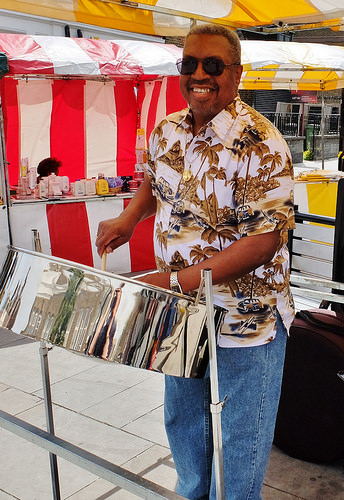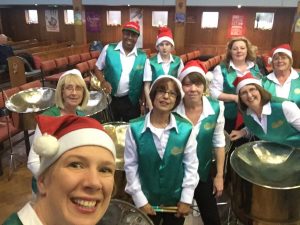By Anthony Layne
WILFRED Hohenkirk is a Guyanese who has been residing in the United Kingdom (UK) since 1976 and has proven that he is truly a man for all seasons: printer, businessman, self-taught pan player/band leader/pan tutor and promoter.
‘Kirk’, as he is popularly known, chatted with the Pepperpot Magazine while on a recent vacation.
‘Kirk’ grew up in the Princes Street, Wortmanville, and Charlotte Street, Bourda, areas and entered the world of work in 1969 as an apprentice in the camera room at Guyana Lithographic. Guyana Lithographic was the precursor to what is now the Guyana National Printers Limited (GNPL).
After completing his five-year apprenticeship, he became a journeyman (a skilled worker employed by another). In May 1976, ‘Kirk’ married his long-standing sweetheart, who was already resident in the UK and on December 6 the same year, he left Guyana to join his wife.

On arrival in the former mother country, ‘Kirk’ found the going tough, as he soon learned that it was not easy to get back into the printing industry there. In the meantime, he took a job in a meat-processing factory, which entailed working all day in a huge freezer, making and packaging beef burgers. “Having just come from a warm country, I found it tough, but I persevered,” he said.
It was not until about six months later that he discovered why he was unable to land a job in the printing industry. Before his departure from Guyana, he was given an introductory letter by his local union, the Printing Industry and Allied Workers Union (PIAWU), to its counterpart in the UK, the National Graphics Association. But this was not the union to which he should have been directed. “Whereas in Guyana there was one printers’ union, the PIAWU, in the UK there were two: one union for the pressmen and one for pre-press personnel; I was sent to the pressmen’s union, but no one pointed me in the right direction. It wasn’t until about six months later when I discovered that the union I should have joined was the Society For Lithographic Artists, Designers and Engravers (SLADE),” he said. “Once I joined the union, I got a job straight away in 1977, through the union’s ‘white card system.’ With the union’s white card in my possession, no employer could refuse to hire me; a job in the printing industry was there to refuse, or to take.”
At this point, ‘Kirk’ reflected on the extraordinary coincidence of leaving Guyana on December 6, 1976, and collecting the keys to his own home two years later on the same date.
Having landed the job he really wanted, ‘Kirk’ said that he enjoyed every moment of it. But by 1995, he felt he was sufficiently proficient, experienced and confident to venture out on his own; so, in 1995, he established his own design and graphics company – making him one of the few blacks in that field. But he soon discovered that it was no walk in the park. “The particular field I was in, was between the designer and the printer and as time and technology moved ahead, the printer was doing some of what I was doing, the designer was doing some of what I was doing; so companies like mine were going into liquidation, left, right and centre, but I kept going for as long as I could,” he explained. He however finally decided to sell his company in 2002.
NEW DIRECTION
Before parting with his company, he would make an acquaintance which led him into an entirely new and unexpected direction. Once a year in the summer, he would hold bar-b-ques for his staff and clients and hire a steel band to entertain them. Consequently, pan music grew on him, so when the band leader, a national of Dominica, approached him with a proposal, he readily agreed. The Dominican proposed the merging of Kirk’s business acumen with his (the Dominican’s) virtuosity with the steel pan; together, they could “carve into the pan fraternity” in the UK and earn for the art form, some degree of respectability. ‘Kirk’ considered the idea and after concluding that it had some merit, sold his company and started to learn to play the steel pan under the tutelage of the Dominican; he also introduced his daughter, Miranda, to the instrument. About six months into his pan lessons, however, fate dealt him a cruel hand: his tutor was forced to return to his homeland because he had overstayed his time in the UK. How did he respond to that setback? He did not despair, because by then, he felt that he had already learnt enough to continue on his own – and continue he did, intensifying his practice. And he found that being self-taught eventually redounded to his benefit. “Because of that [teaching himself], my style of playing is unique…different from lots of pan players,” he asserted. ‘Kirk’ now has his own band called the Phase 5 Steel Band and so far they have done gigs in Monaco, Switzerland and Germany.
GIVING BACK
In 2007, ‘Kirk’ was commissioned to do a series of steel pan workshops with teenagers in his area for a period of six months. At the end of the six-month period, the teens were so much into the music that they did not want to stop playing. However, there was no more funding available to make this to happen, so he funded the instruments himself, found a venue and continued teaching them free of cost. “I suppose you could say that I was giving back to the community,” he said. The band (Steel Ambition), had reached a high standard; so much so, that he even took them to play at the Nottinghill Carnival (the biggest street festival in Europe). But as the band members got older and took on greater responsibilities, the ensemble disbanded. However, about five years ago, he formed a community band for adults in the county of Kent, where he resides. The band, named The Emeralds, consists of 12 members, all of whom are mature English women, the oldest being a septuagenarian. They do a few performances per year, the highlight of which is their appearance on the bandstand in the local park. This event is usually attended by the local Mayor and a large, eager audience.
About 14 years ago, ‘Kirk’ was asked to tutor some adults with learning difficulties, who had many a tutor show up once and never return. He took up the challenge and has been their tutor since then. They now have a band of their own and play, with help, at a few events in their community.
Meanwhile, Miranda, his daughter, has surpassed him. As he jokingly acknowledged, “Because she was younger, and had a younger brain, she went on to pursue the art form at college and university levels; she now holds a Bachelor of Arts Degree from Middlesex University in steel pan music and plays in my band. I think she is now a better pan player than I could ever hope to be; while I play with feeling, she plays more clinically, every note is correct and clinical.”
Dr. Lionel McCalman, writing in a UK-based online publication, When Steel Talks, paid tribute to Miranda in 2005: “Miranda Hohenkirk is a young lady who became interested in the steel pan, after being introduced to the instrument by her father. He is a pan musician with Nostalgia steel band and a steel band teacher in local schools in the London borough of Newham. Miranda became one of the youngest players in Nostalgia Steel Band, a ‘pan-around-neck’ steel band, playing the tenor pan and the double second in her father’s steel band combo. Her journey this far should be an inspiration to all of us involved in our community steel bands.”
But Kirk has progressed too: as mentioned above, he now teaches the art form in schools. But, being self-taught, getting to this level was not easy for him: “It took me about three years of arduous practising, meeting and talking with experienced pannists like Aubrey Bryan of Guyana- now residing in the UK, and doing diligent research; diligent research, because I wanted to be sufficiently knowledgeable about the art form to be able to answer intelligently, questions asked by my students.”
PLEASANTLY SURPRISING

What has been pleasantly surprising him as a steel pan teacher/trainer, he said, is that most of his students are white and they do well; he said that he has taught students pan music up to the level of the General Certificate of Secondary Education (GCSE). He also finds it very gratifying. “It makes me feel good to know that I’m playing a part in helping to bring some degree of respectability to steel pan music.”
He recalled his boyhood days in Georgetown and the stigma that was associated with steel bands and by extension, steel pan players: “ When I was growing up, I was told…I couldn’t be seen near a steel pan…you know, those rogues and vagabonds and all that.” But in England, pan music is slowly but surely moving into the realm of respectability. “Now more and more English people are hiring steel bands to play at weddings, dinners and conferences,” he stated. Further, he said he often reflects on the irony of now having to earn his livelihood from an art form that he was taught to scorn during his formative years.
There are many steel bands in the UK, he said, but some of them are found wanting – especially with regard to punctuality. Consequently, he does his best to make a difference in that regard and works with other bands to help them improve.
Finally, Kirk gave his impressions on the state of the art form in Guyana: “I’ve been fortunate to hear several of the bands here and they sounded very good, but I’m most impressed with the Police Steel Band. What I’m highly pleased about, is the fact that there are now bands in some of the top secondary schools – in Queen’s College of all schools. This is a tremendous boost for the art form here and it shows that the de-stigmatisation of steel band music is well advanced.”
‘DOUBLE BUBBLE’
Has he ever seriously considered re-migrating? “At one point, I didn’t think that I would ever seriously consider that. However, as I visit almost yearly, I have seen encouraging and gradual changes for the better, especially the cleanliness of the environment. Consequently, the idea of re-migrating has become increasingly appealing,” he stated. He is, however, concerned about the level of criminal activity, especially against visitors. So concerned is he, that he believes there should be “Double Bubble”; that is, the doubling of prison sentences for criminal attacks against expatriates and visiting nationals. “That might help to deter criminal acts against expatriates and visitors may be more inclined to come to Guyana – this beautiful land that has so much to show off,” he said.



.jpg)








